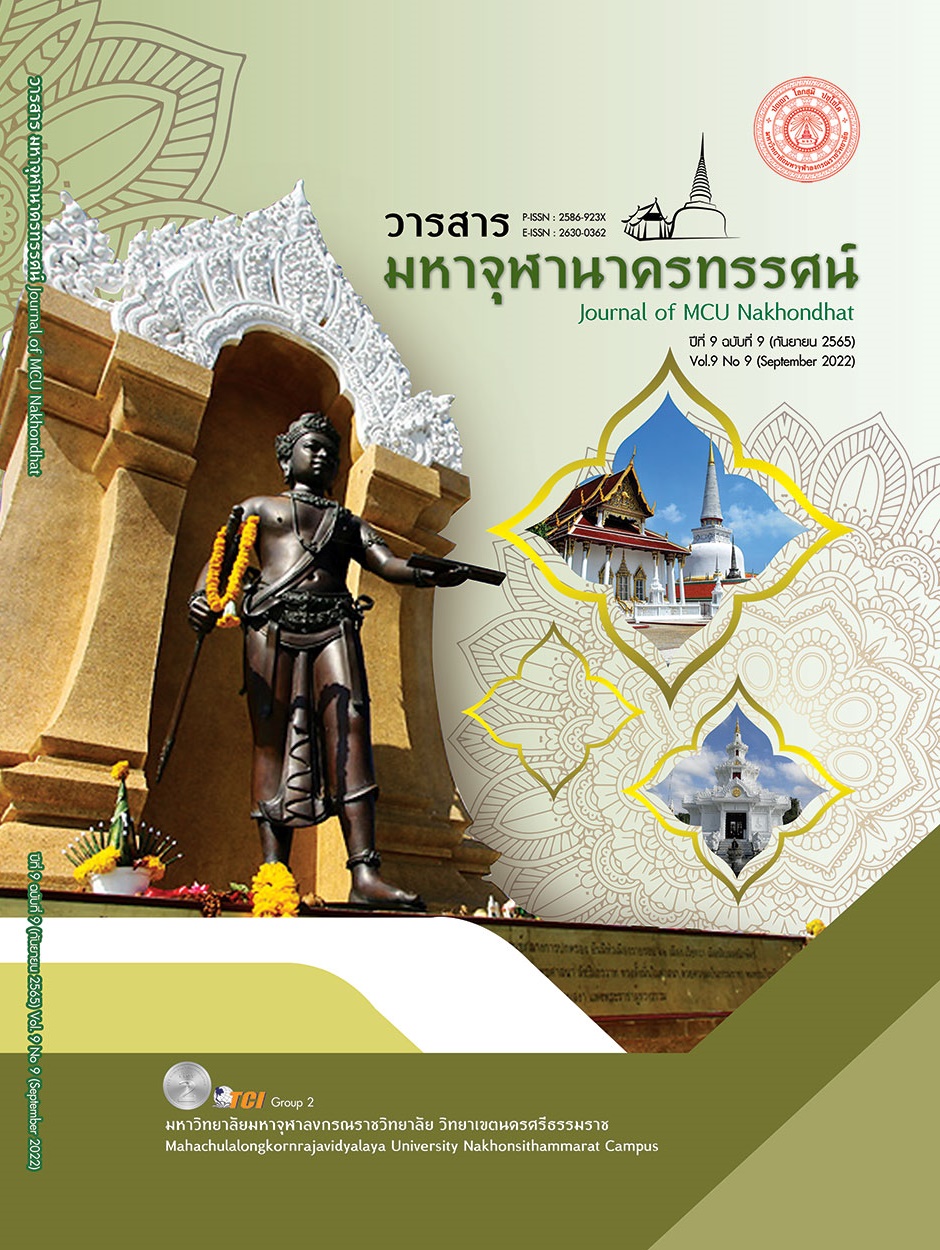THE TACTCS ACTUATION OF THE FIVE PRECEPTS VILLAGE IN NAKHON RATCHASIMA
Main Article Content
Abstract
The objectives of this research article were to: 1) study operation processes of the Project 5 Buddhist Precepts Villages in Nakhon Ratchasima province, 2) analyze and learn lessons from the Project 5 Buddhist Precepts Villages in Nakhon Ratchasima province and 3) propose strategies for driving the Project 5 Buddhist Precepts Villages in Nakhon Ratchasima province. This qualitative was conducted by studying of documents, in-depth interview and focus group discussion. Sample selected by purposive sampling was 25 informants consisted of 5 groups each group 5 people as: 1) Monks in provincial level, 2) Monks in district level, 3) Monks who were complied with the principle of 5 Buddhist precepts, 4) Laymen in provincial level and 5) Laymen in district level. Contents were analyzed and concluded in form of overview. The research revealed that: 1. Operation processes of the Project 5 Buddhist Precepts Villages in Nakhon Ratchasima province were as follows: 1) Participating with all sectors to develop the 5 Buddhist precepts villages, 2) Providing of activities to comply with the 5 Buddhist precepts; 2. Analyze and learn lessons from the Project 5 Buddhist Precepts Villages in Nakhon Ratchasima province was conducted by establishing of monk networks for cooperation based on the regulation of the Sangha Supreme Council of Thailand on the Project 5 Buddhist Precepts Villages for achieving targets by management, coordination, strategic formulation, planning, monitoring and evaluation as well as reporting; 3. Strategies for driving the Project 5 Buddhist Precepts Villages in Nakhon Ratchasima province were as follows; Strategy 1 - Expansion of networks for covering all areas by integrating both of the Sangha and provincial strategic plans for developing activities of the Project 5 Buddhist Precepts Villages; Strategy 2 - Integrating the Sangha plans with community activities under the provincial strategic plans for developing the Project 5 Buddhist Precepts Villages and; Strategy 3 - Creation of awareness and participation on the development of the Project 5 Buddhist Precepts Villages and activities for developing villages for enabling them to create and stimulate people’s conscience for their participation.
Article Details

This work is licensed under a Creative Commons Attribution-NonCommercial-NoDerivatives 4.0 International License.
References
กรมการศาสนา กระทรวงวัฒนธรรม. (2557). แนวทางการดำเนินงานโครงการหมู่บ้านรักษาศีล 5 : ชาวประชาเป็นสุข ในดำริของสมเด็จพระมหารัชมังคลาจารย์ ผู้ปฏิบัติหน้าที่สมเด็จพระสังฆราช ฉบับที่ 2 (ฉบับปรับปรุง). กรุงเทพมหานคร: โรงพิมพ์ชุมนุมสหกรณ์การเกษตรแห่งประเทศไทย.
พระครูศรีปริยัตยารักษ์. (17 กันยายน 2563). รูปแบบการสร้างเครือข่ายหมู่บ้านรักษาศีล 5 เพื่อการพัฒนาคุณภาพชีวิตของประชาชนจังหวัดนครราชสีมา. (ประสิทธิ์ ชะนะมาร, ผู้สัมภาษณ์)
พระพรหมคุณาภรณ์ (ป.อ. ปยุตฺโต). (2550). ธรรมนูญชีวิต. กรุงเทพมหานคร: เอส.อาร์. พริ้นติ้ง แมส โปรดักส์.
พระมหากฤษฎา กิตฺติโสภโณ. (2558). การสร้างความปรองดองสมานฉันท์ ด้วยการขับเคลื่อนโครงการ หมู่บ้านรักษาศีล 5 จังหวัดพระนครศรีอยุธยา. ใน รายงานการวิจัย. พระนครศรีอยุธยา: สถาบันวิจัย พุทธศาสตร์ มหาวิทยาลัยมหาจุฬาลงกรณราชวิทยาลัย.
พระมหาบุญเลิศ อินทปัญโญ, และคณะ. (2556). หมู่บ้านรักษาศีล 5 : รูปแบบและกระบวนการเสริมสร้างวัฒนธรรมการอยู่ร่วมกันของสังคมไทย. พระนครศรีอยุธยา: สถาบันวิจัยพุทธศาสตร์มหาวิทยาลัย มหาจุฬาลงกรณราชวิทยาลัย.
พระมหาปัญญาวรวัฒน์ สิริภทฺโธ. (17 กันยายน 2563). โครงการหมู่บ้านรักษาศีล 5 จังหวัดนครราชสีมา. (ประสิทธิ์ ชะนะมาร, ผู้สัมภาษณ์)
พระมหายุทธนา นรเชฏฺโฐ และจุฑารัตน์ ทองอินทร์. (2559). แนวคิด องค์ประกอบ ตัวชี้วัด บทเรียน และการบูรณาการรักษาศีล 5 ตามโครงการหมู่บ้านรักษาศีล 5. พระนครศรีอยุธยา: สถาบันวิจัยพุทธศาสตร์ มหาวิทยาลัยมหาจุฬาลงกรณราชวิทยาลัย.
พระเมธีสุตาภรณ์. (17 กันยายน 2563). การพัฒนารูปแบบโครงการหมู่บ้านรักษาศีล 5 จังหวัดนครราชสีมา. (ประสิทธิ์ ชะนะมาร, ผู้สัมภาษณ์)
พุทธทาสภิกขุ. (2539). ทาน ศีล ภาวนา. กรุงเทพมหานคร: สุขภาพใจ.
แพรภัทร ยอดแก้ว. (2558). การถอดบทเรียนการดำเนินงานหมู่บ้านศีล 5 ของจังหวัดนครปฐม. นครปฐม: สถาบันวิจัยมหาวิทยาลัยราชภัฏนครปฐม.
สำนักงานกิจการสตรีและสถาบันครอบครัวกระทรวงการพัฒนาสังคมและความมั่นคงของมนุษย์. (2554). แผนพัฒนาสตรีในช่วงแผนพัฒนาเศรษฐกิจและสังคมแห่งชาติ (ฉบับที่ 11). กรุงเทพมหานคร: สำนักงานกิจการสตรีและสถาบันครอบครัว.
สำนักงานพระพุทธศาสนาแห่งชาติ. (2557). คู่มือการดำเนินงาน โครงการสร้างความปรองดองสมานฉันท์โดยใช้หลักธรรมทางพระพุทธศาสนา “หมู่บ้านรักษาศีล 5”. กรุงเทพมหานคร: สำนักงานพระพุทธศาสนาแห่งชาติ.
สุภางค์ จันทวานิช. (2556). วิธีการวิจัยเชิงคุณภาพ. (พิมพ์ครั้งที่ 18). กรุงเทพมหานคร: สำนักพิมพ์แห่งจุฬาลงกรณ์มหาวิทยาลัย.


